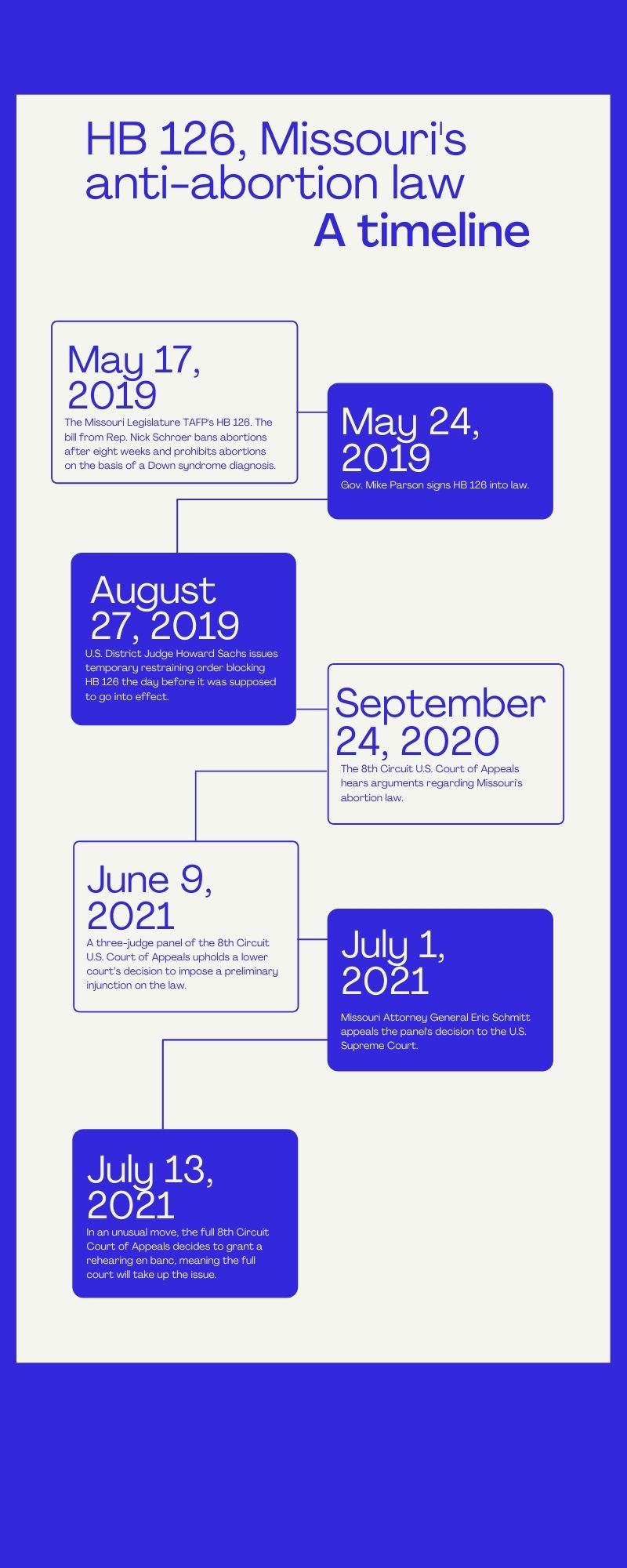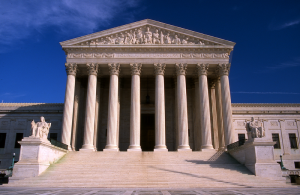A federal court is set to consider a years-long conflict over a controversial abortion law after vacating a panel’s decision to block the provision from being enforced.
The Eighth Circuit Court of Appeals vacated a three-judge panel’s decision halting HB 126, known as the “Missouri Stands for the Unborn Act,” which enacts restrictions on abortions in Missouri. While the case had been appealed to the U.S. Supreme Court, the full appellate court will now consider the fate of the law.
Here’s a look at the controversial measure, from what the bill would do to where it stands in the courts.
What would the law do?
HB 126 — championed by Republican Rep. Nick Schroer and signed into law by Gov. Mike Parson in 2019 — sought to ban abortions after eight weeks. It included “nestled” components placing restrictions at 14, 18, and 20 weeks and did not allow for exemptions for rape or incest survivors. Violation of the measure would be a class B felony.
The bill also sought to ban abortions solely based on a diagnosis of Down syndrome.
“Having our law succeed in court would further solidify the fact that Missouri truly stands for the most vulnerable in our society: the unborn,” Schroer told The Missouri Times. “It would show the many pro-life Missourians that have fought for decades to protect those at the beginning of their lives that their hard work has paid off. Most importantly, it would further a universal goal of ending the genocidal act of abortion in the heart of America.”
So what’s happening?
A federal judge blocked the bill from being implemented the day before it was set to go into effect in 2019, a decision that was appealed to the Eighth Circuit Court of Appeals. A three-judge panel stymied the law last month, upholding the injunction based on the state’s argument and its finding that the language constituted bans on abortion — something the court previously opposed in a similar law from Arkansas.

“[Missouri] failed to demonstrate that its policy priorities outweigh the public interest in access to pre-viability abortions or the significant interference with [Planned Parenthood’s] business and the harm to pregnant individuals who might seek a pre-viability abortion before final judgment in this case,” the panel said.
Attorney General Eric Schmitt, who is representing the state, appealed the decision to the U.S. Supreme Court earlier this month. The nation’s highest court has already agreed to take up a Mississippi law banning abortions after 15 weeks. Schmitt, a vocal proponent of the bill, previously told The Missouri Times he “will never stop fighting to ensure that all life is protected.”
However, in a rare move, the court granted a rehearing en banc on its own motion last week, meaning it would rehear the case as a full court.
“We’re certainly encouraged by the Eighth Circuit’s decision to vacate and order a rehearing, and we look forward to the opportunity to vigorously defend this law again,” Chris Nuelle, a spokesman for Schmitt, told The Missouri Times in an email.
While he could only speculate on the reason for the turnaround, Schroer said the court’s decision to reconsider the case gave him and other supporters hope that the law will stand.
“HB 126 was carefully crafted to comply, rather than conflict, with the case law relating to abortions,” he said. “Myself and the other architects of this monumental law read the guidance from learned justices so that the gestational and reason bans contained within the Missouri Stands for the Unborn Act would strictly comply with their guidance and rationale. I pray the Eighth Circuit agrees.”
What does the opposition say?
Planned Parenthood, the sole abortion provider in the state with one clinic currently offering the service, has been a vocal opponent to the measure. Yamelsie Rodriguez, president and CEO of the Reproductive Health Services of Planned Parenthood of the St. Louis Region, said the conflict would continue.
“We have long said the fight to protect abortion access in Missouri is far from over,” Rodriguez said in a statement to The Missouri Times. “The Eighth Circuit’s sudden change to reconsider Missouri’s sweeping abortion ban — one the court said was unconstitutional — is just another troubling signal in a long line of threats to our reproductive freedom. For now, nothing has changed; abortion remains legal in Missouri. RHS is still here.”
The court has yet to set a timeline for its consideration of the case.







































